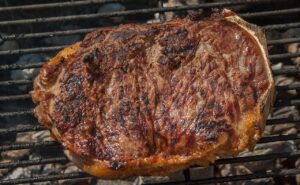Grilling is a popular way to cook food, especially during the summer months.
However, there’s nothing more frustrating than turning on your gas grill and realizing it’s not getting hot enough to cook your food properly.
If you’re experiencing this issue, don’t worry – you’re not alone. In this article, we’ll explore some of the most common causes of a gas grill not getting hot and provide you with step-by-step instructions for troubleshooting and maintaining your grill.
Common Causes of a Gas Grill Not Getting Hot
Dirty or Clogged Burners
Over time, burners can become clogged with debris or grease, preventing them from heating up properly. To clean your burners, first, turn off the propane tank and disconnect the gas line.
Remove the burners and use a wire brush or a toothbrush to clean the burner ports and remove any debris or grease. Once you’ve cleaned the burners, reassemble your grill and test it to see if it’s heating up properly.
Low or Empty Propane Tank
If your propane tank is running low or is empty, your grill won’t be able to generate enough heat. To check your propane levels, turn off the grill and disconnect the tank.
Weigh the tank to determine how much propane is left. If the tank is low, you can either refill it or replace it with a new one.
Faulty Regulator
The regulator is responsible for controlling the flow of gas to your grill. If it’s not working properly, your grill won’t be able to heat up properly.
To check the regulator, first, turn off the propane tank and disconnect the gas line. Remove the regulator and inspect it for any damage or wear. If the regulator is damaged, you’ll need to replace it.
Malfunctioning Ignition System
If your grill’s ignition system isn’t working properly, you won’t be able to light the burners and generate heat.
To test the ignition system, turn off the propane tank and disconnect the gas line. Remove the ignition system and check it for any damage or wear. If the ignition system is damaged, you’ll need to replace it.
Airflow Issues
If your grill isn’t getting enough oxygen, it won’t be able to generate enough heat. This can be caused by a variety of factors, including a dirty grill or a faulty venturi tube.
To improve airflow, first, turn off the propane tank and disconnect the gas line. Remove the burners and clean the grill thoroughly.
Check the venturi tubes for any damage or wear. If the venturi tubes are damaged, you’ll need to replace them.
How to Troubleshoot Your Gas Grill
Step-by-step instructions for checking and cleaning burners
Tips for checking propane levels and replacing tanks
How to identify and fix issues with the regulator
Steps for testing and repairing ignition systems
Techniques for improving airflow and ventilation
Maintenance Tips to Keep Your Gas Grill Heating Properly
Regular cleaning and maintenance routines
How to store your grill during the off-season
Tips for extending the lifespan of your grill
Why isn’t my gas grill getting hot?
If your gas grill isn’t getting hot, there could be several reasons for this issue. It could be a problem with the burner, regulator, gas leak, propane tank, gas flow, hose, or even a clog.
How do I know if my gas grill isn’t getting hot enough?
You can tell if your gas grill isn’t getting hot enough by checking the thermometer on the grill.
If the temperature is not reaching the desired level or if the flame is low, it indicates that your grill isn’t getting hot enough.
What should I do if my grill isn’t getting hot enough?
If your grill isn’t getting hot enough, you can try troubleshooting the issue. Check the gas line, regulator, control knobs, and make sure there are no blockages or leaks.
You may also need to reset the regulator or check for an overfilled propane tank.
Why is my grill not getting hot even with the gas on?
There can be various reasons why your grill isn’t getting hot even with the gas on. It could be due to a faulty regulator, insufficient gas flow, clogged burners, or a safety device that is not working properly.
What should I do if I suspect a gas leak?
If you suspect a gas leak, it’s important to turn off the gas supply to your grill immediately. Open the grill lid to let the gas dissipate and avoid any potential hazards.
It’s recommended to seek professional help to safely fix the issue.
How can I increase the heat on my gas grill?
To increase the heat on your gas grill, you can check the gas regulator safety device and ensure it’s working properly.
Make sure the gas flow from the propane tank is sufficient, and clean any debris or blockage in the grill burners for improved heat.
What are the common causes of low flame and heat problems?
Common causes of low flame and heat problems in a gas grill include a faulty regulator, low gas pressure, clogged burners, inadequate gas supply, or problems with the gas flow.
These issues can prevent your grill from getting as hot as it should.
How can I troubleshoot my gas grill?
To troubleshoot your gas grill, you can start by checking the gas line, regulator, and control knobs for any issues.
Conclusion
Remember, a well-maintained grill is a happy grill. By following these tips and troubleshooting steps, you can ensure that your gas grill is heating up properly and cooking your food to perfection.

